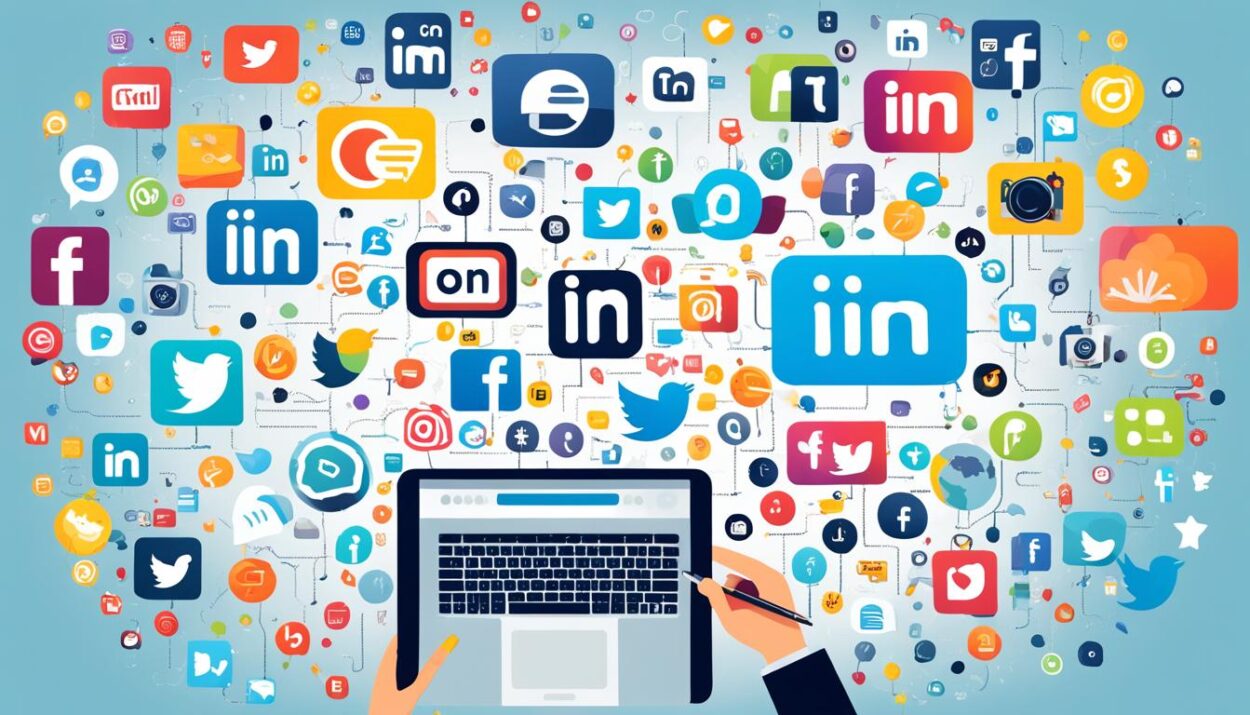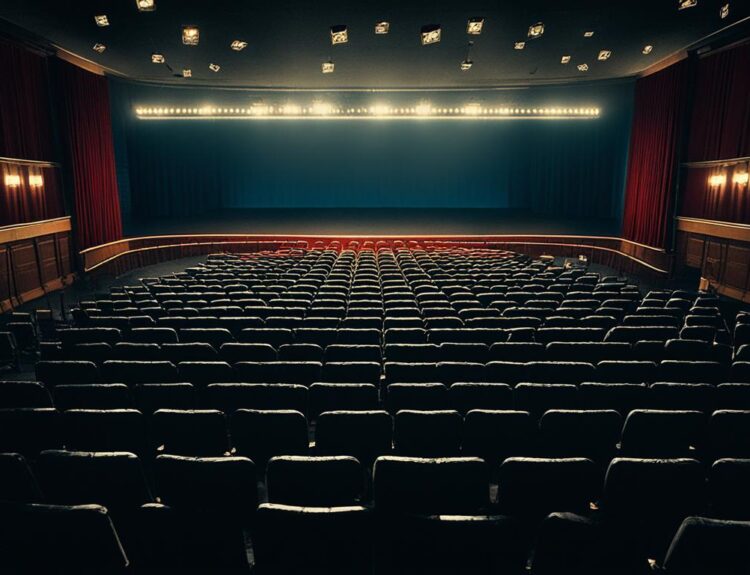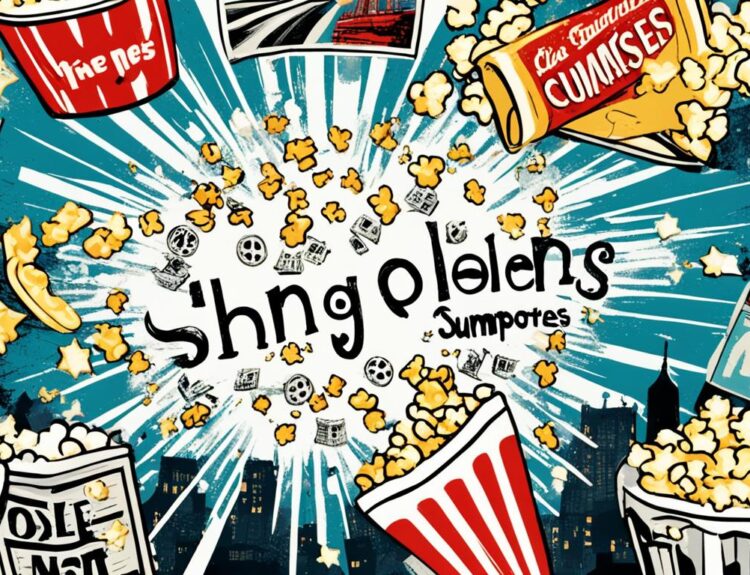Top movie studios such as Warner Bros., Universal Pictures, and Disney invest over $150 million in marketing. They do this to make sure their films are a hit1. The rise of streaming services like Netflix and Amazon Prime is changing the game. These platforms are becoming more powerful every day1.
This shift means marketing strategies need to evolve. What used to work no longer does as digital platforms take the lead. Digital marketing is now key because it reaches more people and its success can be accurately measured1. These changes underline how important it is to use digital media wisely in movie marketing today1.
Key Takeaways
- Major film studios invest over $150 million in marketing campaigns to ensure box office success.
- The digital transformation is reshaping movie marketing strategies.
- Streaming platforms are influencing the need for evolved marketing techniques.
- Digital marketing channels offer wider reach and more measurable results than traditional media.
- Adapting to digital media is crucial for the success of modern movie marketing campaigns.
Introduction to Modern Movie Marketing
The movie world is changing fast, moving from old-style to digital marketing. This change matches how people act today and takes advantage of new digital chances.
Shift from Traditional to Digital Marketing
Statista shows more money is going into digital marketing for movies and less into old ways1. Social media and online ads are replacing things like posters1. Film studios see a big jump, 38%, in how many people watch trailers online2.
Also, movies get way more attention on social media now, 45% more in five years2. This shows why digital ways are key to promoting movies today.
Importance of Digital Platforms
Digital platforms are now central to the success of marketing films. With billions of users, social media can reach a lot of people1. Sites like Facebook and TikTok are important for getting in touch with audiences.
TikTok, where people spend about 11 minutes a pop, is very engaging1. Virtual reality also gets audiences more involved, 60% more than old tactics2. Plus, smart data use in ads can boost how often people respond by 25%2.
The Rise of Streaming Platforms
Streaming platforms have changed how we watch shows and movies. Unlike the old days when cinema ads were everything, now Netflix and Disney+ are taking over. This shift is big for movie fans and the industry.
Impact on Traditional Cinemas
Traditional cinemas are losing ground because streaming is more popular. In 2018, 28% of people chose cinemas first, but by 2020, only 14% did. Streaming won 36% of viewers3. Also, streaming is cheaper than movie tickets, making it the go-to for many3. Fewer people are going to cinemas, so box office sales are dropping3.
Opportunities for Independent Films
However, streaming services are great news for independent films. They let indie filmmakers reach audiences worldwide. By June 2020, 85% of US households had a streaming subscription4. This means indie movies can be seen without the huge costs of cinema releases. Streaming sites like Netflix and Amazon Studios have even created award-winners like “Roma” and “Manchester by the Sea.”4
Streaming lets us watch more unique and indie films, enriching our choices. In the UK, 24% know about MUBI, an indie film streaming service4. This shift gives us stories and cultures from everywhere, a win for both creators and fans4.
The future of film marketing is mixing streaming with traditional cinema ads. With tools like data analytics and AI, marketing is getting sharper. Digital marketing is making movies more diverse and enjoyable for us all5.
Social Media as a Promotion Powerhouse
In 2023, social media platforms have grown, now having 4.8 billion users. They are key in marketing films effectively. They connect studios with different groups of people. Each platform brings its own benefits and targets specific audiences, essential for promoting movies.
Popular Social Media Platforms
Facebook, TikTok, Twitter, and Instagram have changed film marketing. Facebook reaches almost 3 billion people a month6, appealing to various age groups. This makes it a flexible tool for movie ads. TikTok, known for keeping users the longest, focuses on the youth, college students, and gamers7.
Twitter is becoming more popular with the young and is key for creating buzz about movie launches6. Instagram is visited a lot by millennials and Gen Z, making it crucial for reaching those who are always online7.
Engagement Metrics to Monitor
It’s vital to watch and analyze how people interact with film promotions on social media. Measures like likes, shares, comments, and video views help understand the audience’s reaction. Replying to comments and asking for tags can spread the word effortlessly8.
Hashtags such as #FreeGuy and #RyanReynolds help bring people together and encourage them to share content7. Being verified on social media adds trust, grows followers, and reduces fake profiles. This makes your profile more likely to be seen in searches8.
Sharing what happens behind the scenes attracts many fans8. Using digital marketing wisely can lead to informed choices, lower costs, and better results6.
Overall, marketing movies on Facebook, TikTok, Twitter, and Instagram is vital. It connects with various audiences, ensuring the success of film promotion today.
Movie Trailer Launches and Their Evolution
Movie trailers have changed a lot since we first got digital platforms. They’re key to promoting movies now. Once just in theaters, trailers have moved online to reach more people quickly. Thanks to social media, film studios can show their trailers to millions instantly2. This move to digital shows how studios are adapting to our digital world.
Traditional vs. Digital Trailers
In the early 1900s, trailers began with Nils Granlund’s promotion for The Pleasure Seekers9. The National Screen Service dominated the trailer scene from the 1910s to the 1960s9. The release of Jaws in the 1970s changed how trailers advertised movies forever9.
Now, trailers are not just in theaters anymore. Sites like YouTube make launching trailers cheap and effective9. Studios use data and targeted ads to make better trailers2. Plus, they can now add VR and AR to make trailers even cooler2.
Case Studies of Successful Campaigns
Disney used apps like Vine and Snapchat to get fans excited early on. Their trailers build a fanbase before the movie even comes out. For instance, NPCUniversal used Facebook to hype up their movies. This shows how online platforms can keep people talking about a movie for a long time2.
The trailer for Blood Simple raised about $550,000 from sixty-five investors9. This shows trailers can be powerful. With digital tools and teaming up with brands, studios can make their trailers go even further2.
| Aspect | Traditional Trailers | Digital Trailers |
|---|---|---|
| Launch Platform | Theaters | Online platforms (YouTube, social media) |
| Audience Reach | Limited to theater-goers | Global reach via the internet |
| Cost | High production and distribution costs | Cost-effective and accessible |
| Repetition and Sharing | Single-view, non-shareable | Easily repeatable and shareable |
Influencer Collaborations for Movie Releases
Influencer collaborations are key in today’s film marketing. They reach and engage audiences effectively, generating excitement for new movies.
Choosing the Right Influencers
Finding influencers who match a film’s audience is vital. They offer authenticity and connect well with people10. Influencers-turned-actors like Liza Koshy add significant value. They bridge the gap between social media and cinema10. Their wide influence on platforms such as Instagram and TikTok reshapes movie promotion strategies11. It’s important to align influencers with the film’s vibe for the best outcome12.
Benefits of Influencer Partnerships
Influencer marketing has many advantages. It taps into ready audiences and provides a customized promotion strategy. Followers trust their favorite influencers, making their film recommendations powerful12.
Getting influencers involved in pre-release events boosts film awareness11. Exclusive access motivates them to share their excitement more12. This approach brings a fresh perspective to promoting films.
Interactive Movie Websites
Interactive movie websites are now vital for engaging audiences and boosting film promotions online. They use dynamic features to grab viewers’ attention, creating a stronger bond with the movies they feature.
Engaging Features
Marketers use interactive tactics on Facebook and other online drives to increase engagement13. They offer behind-the-scenes looks, personality quizzes, and recap quizzes. These activities make the movie experience more immersive13. Memory games with movie stars also build nostalgia and hype for new films13.
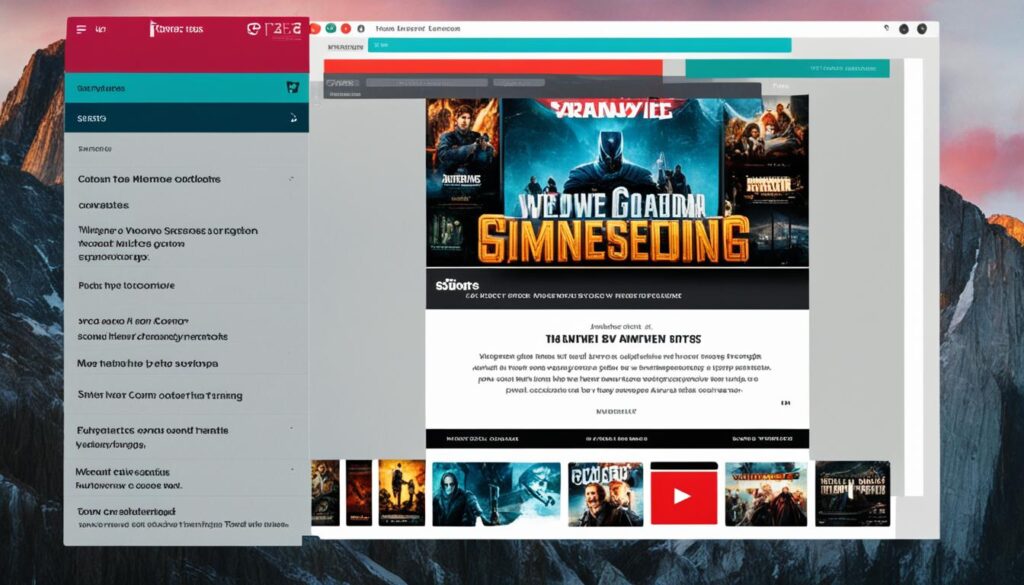
Best Practices for Website Design
Good film website design should focus on being eye-catching and user-friendly. Using standout homepage designs, like the one for The Batman, can keep viewers interested14. Adding games and hidden surprises makes the experience more enjoyable and trendy14.
Easy to navigate sites with fun features often see more clicks and media buzz14. By following these guidelines, filmmakers can create engaging websites. These sites keep audiences interested and support the film’s overall marketing plan.
Celebrity Endorsements for Movies
Celebrity endorsements have become key in movie marketing. They use famous personalities to draw attention and boost promotions. By bringing celebrities on board, movie studios reach out to larger audiences. This increases the excitement around new films.
Adding Star Power to Promotions
When celebrities get involved, interest and ticket sales often soar. For example, Ryan Reynolds backing Mint Mobile led to a revenue leap of 50,000% in three years15. Snoop Dogg made $10 million from a single Corona ad15. Such stories show how celebrity marketing can turn into big profits. They highlight the weight of star endorsements in the film industry.
Effectiveness Measurement
To gauge the success of celebrity endorsements, we look at social metrics and sales figures. The Travis Scott and McDonald’s collaboration is a prime example. It caused a buzz that led to supply shortages and made $20 million for Travis Scott15. Shaquille O’Neal’s “Shaq-a-Roni” pizza sold over 3 million pieces. It helped raise $3 million for charity in just two months15. These facts prove the strong effect of celebrity endorsements on movie marketing campaigns.
Harnessing Data Analytics in Film Marketing
Data analytics is key for film marketing today. It helps track campaign progress and understand what audiences like.
Tracking Campaign Performance
Predictive analytics uses past data and audience feelings to pick better movie scripts16. This means studios know what works before a movie is even made. They track how well their marketing works using special indicators. This includes looking at online searches and how much they earn from being seen more online. This makes sure ads reach the right people16.
Marketing teams create ads that matter to you by looking at your online activity and what you buy16. Big companies like Disney and Marvel predict costs and plan budgets with data analytics. This makes their ads more effective16.
Understanding Audience Insights
Through data analytics, movies can be marketed to specific groups based on what they like16. This means filmmakers can suggest movies you’ll enjoy, keeping you interested16. They also look at feedback after a movie is out. This helps them know what to improve16.
Predictive models tell studios which movies will do well, considering many factors16. Studios even decide on actors by looking at data, ensuring they pick those who audiences will love16.
For more details about using data analytics in movies, check out this article.
SEO and Its Role in Movie Marketing Campaigns
Search Engine Optimization, or SEO, is crucial in getting movies noticed online today. It helps films stand out online and connect with the right viewers. This involves using specific search terms that match what the movie is about and the interests of potential viewers.
Optimizing for Search Engines
Film studios often spend a whopping $150 million on marketing1. Using SEO helps films pop up in organic searches, spreading the word far and wide. By understanding what audiences are looking for and analyzing data, marketers can keep track of SEO’s impact on traffic and sales1. A good SEO strategy makes sure a movie’s online stuff is engaging, helpful, and exactly what people are searching for.
Using Keywords Effectively
Choosing the right keywords is key to marketing movies online. Marketers work to make sure keywords fit naturally into web content, social media, and behind-the-scenes tags. Sites like Facebook and TikTok are perfect for this, reaching billions and keeping users hooked for minutes at a time1. The right keywords help movies reach more people, boost website visits, and increase ticket sales.
Statista’s reports show marketing budgets are moving towards digital1. This shift highlights how critical SEO is in the digital age of movie marketing.
Premiere Event Planning in the Digital Age
Event planning for movie premieres has changed a lot with digital technology. Event planners now mix virtual and live events to catch film lovers’ attention. They use the strengths of both to improve the event experience and reach more people.
Virtual vs. In-Person Events
Virtual events let people from all over the world join without having to travel. These events bring in a big, worldwide audience, spreading the word more17. On the other hand, live events give fans a real, exciting experience. They have red carpet moments and chances to meet people face-to-face. This excitement is hard to get online.
Maximizing Audience Engagement
To plan a great premiere, you need to mix fun and interactive parts. For online events, adding live Q&A sessions, special peeks behind the scenes, and virtual meet-ups can make fans more involved. For live events, having photo opportunities, interactive setups, and entertainment can make things more fun.
Some events show how well this can work. The Blair Witch Project made $248 million from just a $60,000 budget, thanks to its unique way of getting fans involved18. Black Panther also did well, partly because of a campaign that made the community feel involved18.
Mixing online and live event ideas is a great way to plan movie premieres. This mix makes sure the movie grabs and keeps the audience interested.
Leveraging Emerging Technologies in Promotions
Emerging technologies like virtual reality (VR) and augmented reality (AR) are changing how movies are marketed. These tools help create unique and unforgettable marketing experiences. They help make a movie stand out.
Virtual Reality (VR) and Augmented Reality (AR)
VR and AR provide immersive experiences, drawing viewers into a film’s world before it’s even released. VR takes potential viewers on a 360-degree journey into the movie’s universe. Meanwhile, AR brings digital elements into the real world through smartphones or glasses, offering interactive campaigns.
These technologies not only boost audience engagement but also offer insights on user interactions. For example, Vitrina AI analyses data to predict audience behavior. This enhances the effectiveness of VR and AR in movie promotions19.
Interactive Experiences
Interactive marketing makes audiences active participants. Using VR or an AR game can greatly improve a campaign’s success19. These engaging experiences build a stronger connection to the film. They also promote brand loyalty.
Data analysis is key to enhancing these strategies. By measuring engagement and website visits, producers can ensure their VR and AR campaigns hit the mark19. They can reach their target audience more effectively.
Movie Merchandise Marketing
Movie merchandise marketing brings films to life beyond the big screen. Fans can enjoy their favorite movies in new ways with themed products. This method not only boosts fan involvement but also creates extra earnings for studios. For example, themed products keep the movie buzz going long after its premiere.
Creating Themed Merchandise
Designing themed merchandise means truly understanding the film’s fans and what they like. Take “Avatar” for instance. Its merchandise, including toys and video games, fueled excitement before the movie’s release18. This approach played a big part in making “Avatar” the top-earning film ever, by sparking anticipation and providing a deeper connection for the audience.
Boosting Sales Through Limited Editions
Introducing limited edition merchandise can also increase sales. These special items create a sense of urgency and thrill, encouraging fans to buy quickly. For example, “The Simpsons Movie” greatly benefited from exclusive merchandise through a partnership with 20th Century Fox, leading to over $527 million in global earnings18. “IT” also saw success with its merchandise, which was part of a viral marketing campaign that helped create a buzz18. Limited-edition products are great for getting attention and driving sales.
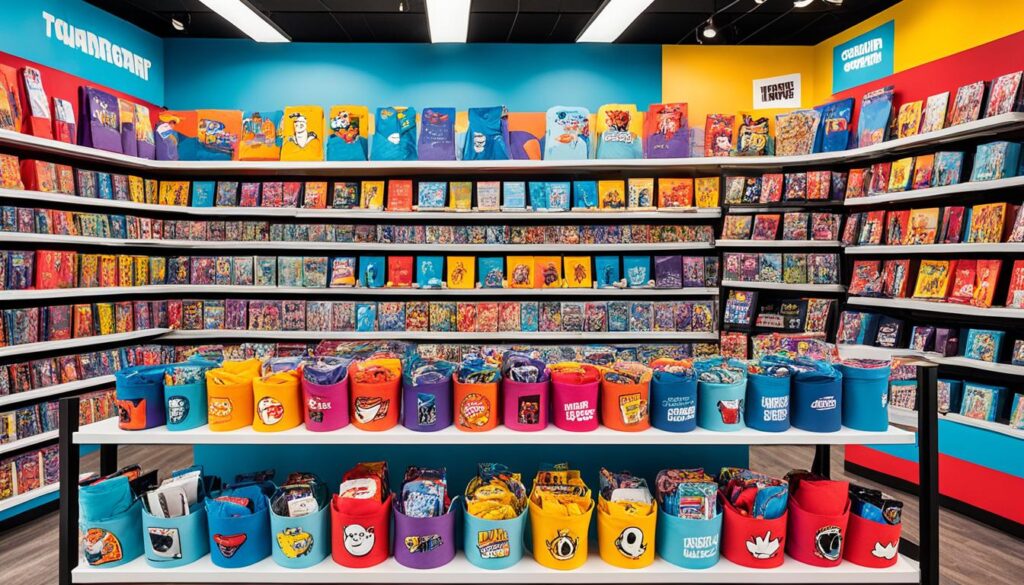
A well-planned movie merchandise campaign can hugely impact a film’s success. It offers fans tangible connections to the film, enhancing engagement. Plus, it opens up new ways for studios to make money.
Conclusion
The way movies are marketed has changed a lot because of the internet. The story of “The Blair Witch Project” shows us how smart ideas can turn a small budget into huge earnings18. This film made $248 million from just $60,000. Also, when 20th Century Fox worked with 7-Eleven for “The Simpsons Movie,” profits soared by 30%. The movie earned more than $527 million globally18.
Today, promoting movies effectively means mastering digital tools. Sites like Facebook, Twitter, and Instagram are key for getting people excited about new films20. “IT” is a great example. The team used various online strategies to draw fans in18. They shared special content, updates from the director, and sneak peeks behind the scenes.
Understanding the audience is vital, and that’s where data analytics comes in20. “Deadpool” and “Get Out” succeeded by targeting their ads well20. Using data, new tech, and teaming up with influencers makes today’s movie marketing more compelling. Embracing digital advances helps filmmakers spread the word effectively, setting up their movies for success in our fast-changing world.
FAQ
What are some crucial elements of modern movie marketing campaigns in the digital age?
How important is the transition from traditional to digital marketing in film promotion strategies?
What impact do streaming platforms have on traditional cinemas and independent film marketing?
Why is social media marketing essential for films, and which platforms are most effective?
How have movie trailer launches evolved in the digital age?
What are the benefits of collaborating with influencers for movie releases?
What features make interactive movie websites engaging?
How do celebrity endorsements add value to movie marketing campaigns?
How is data analytics utilized in film marketing campaigns?
What role does SEO play in movie marketing campaigns?
How has premiere event planning adapted to the digital age?
How can emerging technologies like VR and AR be leveraged in movie promotions?
How can movie merchandise marketing boost overall interest in a film?
Source Links
- https://www.gruvi.tv/post/movie-marketing/
- https://medium.com/@devaraz/the-evolution-of-movie-marketing-how-films-are-promoted-today-8e5055e2b888
- https://blog.filmtrack.com/industry-insights/streaming-platforms-and-their-impact-on-the-film-industry
- https://digitalagencynetwork.com/the-impact-of-streaming-services-on-the-entertainment-industry/
- https://sethero.com/blog/the-future-of-movie-marketing-in-the-streaming-era/
- https://www.linkedin.com/pulse/how-digital-marketing-revolutionizing-movie-web-series-gourav-rao
- https://delaneywitten.medium.com/free-guy-social-media-marketing-campaign-9dc4c4ffc9de
- https://www.stage32.com/blog/a-guide-to-social-media-marketing-for-filmmakers-2975
- https://sites.lsa.umich.edu/mqr/2015/07/a-brief-history-of-film-teasers-or-turns-out-this-post-is-not-about-peter-orner/
- https://flytant.medium.com/the-rising-influence-how-social-media-influencers-are-transforming-into-movie-stars-f2a6c120647b
- https://www.territory-influence.com/influencers-in-the-cinema-industry-opportunities-and-challenges/
- https://www.linkedin.com/pulse/amplifying-your-reach-collaborating-influencers-short-film-gfr8c
- https://qualifio.com/blog/cannes-film-festival-10-interactive-marketing-campaigns/
- https://advertising.amazon.com/library/case-studies/warner-bros-immersive-campaign
- https://www.searchenginejournal.com/social-celebrity-endorsements/415568/
- https://medium.com/@analyticsemergingindia/top-10-use-cases-of-data-analytics-in-film-industry-db20fda72cf1
- https://filmnet.io/the-strategy-of-premiering-at-film-festivals-what-does-premiere-status-mean/
- https://www.sixthcitymarketing.com/2024/02/21/movie-marketing-campaigns/
- https://vitrina.ai/blog/film-marketing-strategies-producers/
- https://markitome.com/blog/how-movie-marketing-is-revolutionised/
